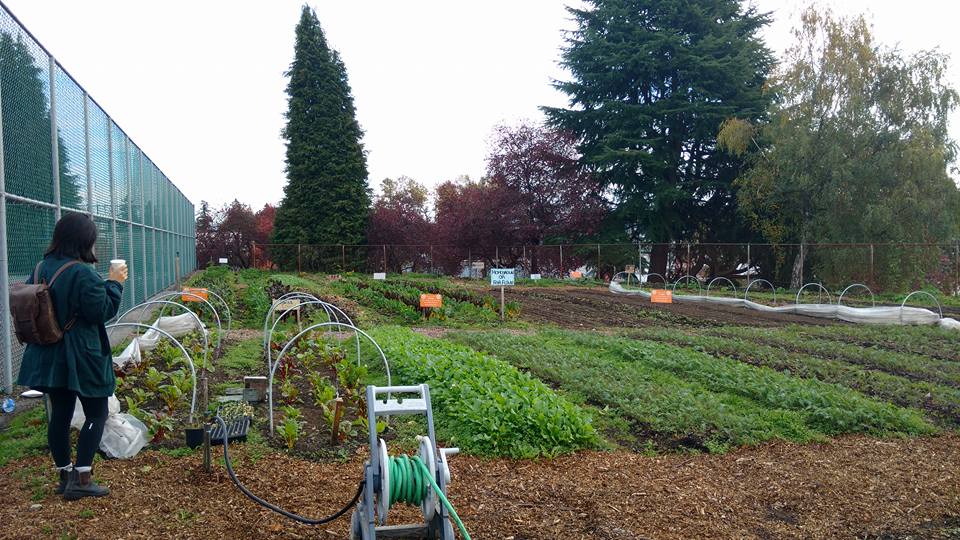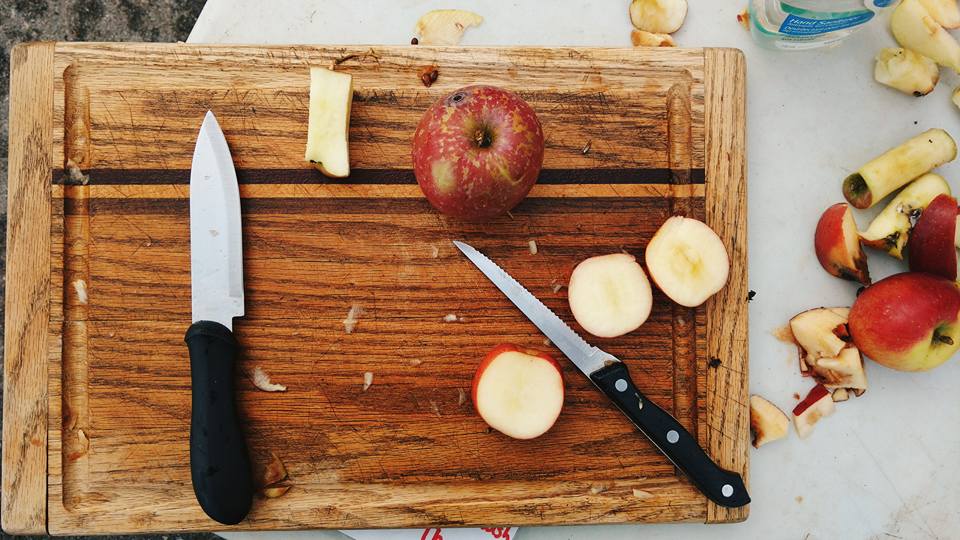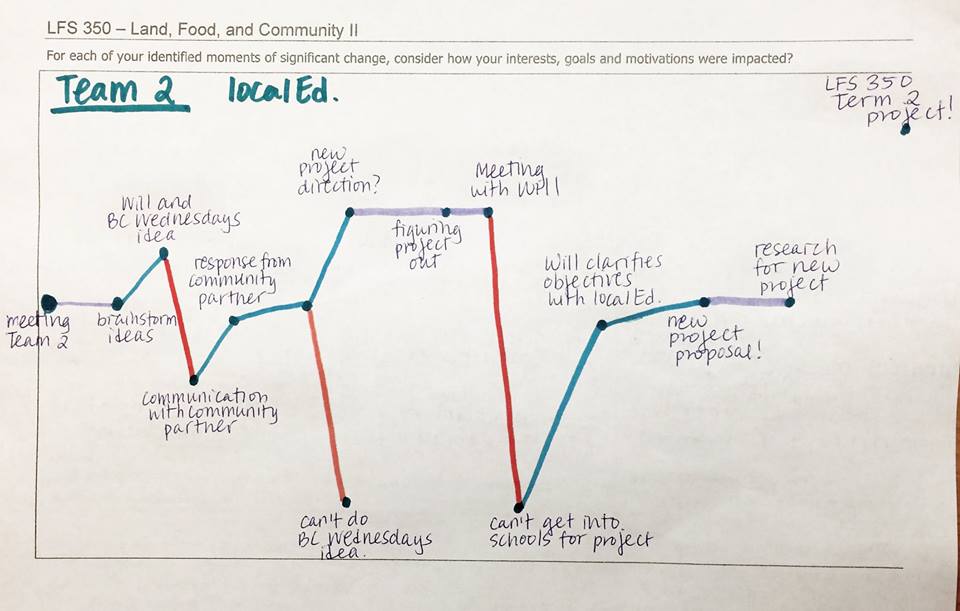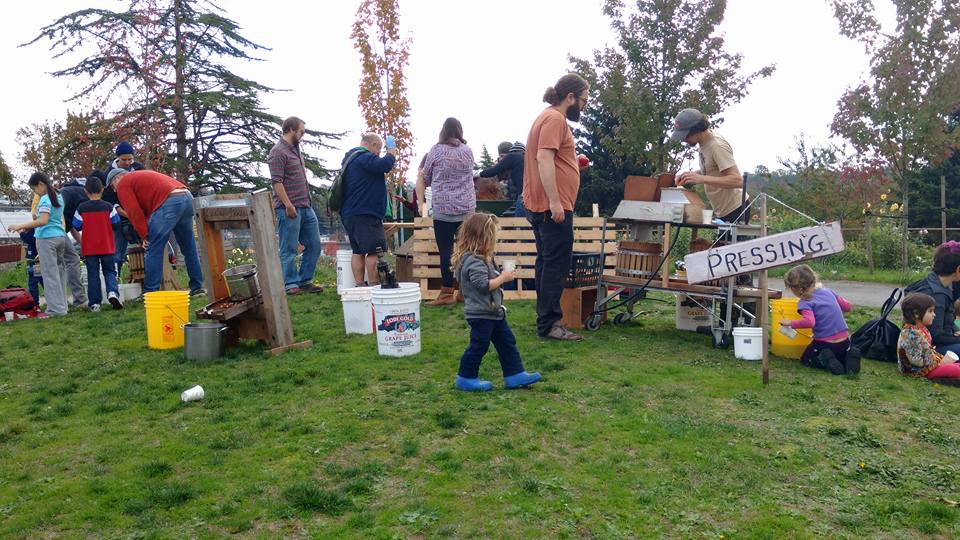PROJECT PROGRESS

“Success is not final, failure is not fatal” – Winston Churchill
Sometimes the journey is more rewarding than the final destination. Throughout the course of this project, localEd has experienced many moments of significant change, turning points, and struggles. But through time and with the help of supportive community partners, localEd is on the right track with our revised project vision and goals.
Weekly Objectives
- Finish Revised Proposal Report with new project vision and details
- Meet with Vanier Dining Hall purchasing manager, Victoria Wakefield to discuss wholesale prices for local food
- Meet with local registered dietician, Nicole Fetterly, to explore nutrition aspects of recipes
- Conduct taste testing session on Wednesday, November 11th
- Decide on potential locations of where the community project could take place for the LFS 350 Term 2 class
- Update community partners with project progress via email
Achievements
- Finalized recipe list and details
- Created contact list for next semester’s LFS 350 team
- Visited David Thompson Secondary School to evaluate cafeteria kitchen and home economics class resources
- Discovered more of what Fresh Roots does with the local Vancouver community by attending their event: East Vancouver Apple Press Fest at Vancouver Technical Secondary School

Moment of Significant Change Workshop
“It may be that when we no longer know what to do, we have come to our real work and when we no longer know which way to go, we have begun our real journey.” – Wendell Berry
As a team, we have gone through many ups and downs to get to where we are currently. There were many times where the project plan and vision needed to be changed due to conflicts that we faced. After discussing and recording the changes during the Moments of Significant Change Workshop provided us an overall picture of our team’s journey. The workshop also allowed us to assess our performance as a team. When our plans were dashed and expectations were not met, localEd experienced moments of disappointment and frustration (indicated by the red lines in the graph). These red lines also reflect brief bouts of hopelessness. Although there were tough times, we also had positive changes that helped us move forward (indicated by the blue lines). These moments usually occurred after a period of disappointment, from which we were able to transform our challenges to a doorway to different and meaningful opportunities. When the project was running fairly smoothly, we felt at ease (indicated by the purple lines). Within these time frames, localEd was steadily striving to work towards our weekly objectives with less disruption to our plans.

We have identified several significant moments in our timeline, as shown in Figure C. We will further elaborate on these points in more detail:
- Meeting Team 2: The initial formation of the team began on the first day of class. Our group consisted of six members from various disciplines: nutritional sciences, international nutrition, food science, and applied biology. Everyone was both anxious and excited about the project we were to receive.
- Brainstorm Project Ideas: We were assigned to design our own project based on the goals of the Vancouver Food Strategy project, and because almost every group member was from a different discipline, we initially had trouble accommodating each member’s interests. Furthermore, during tutorial session, many of our presented ideas were not feasible due to the time restriction of the course. This was a major discouragement as it challenged our ability to keep a positive outlook on the project. In retrospect, most of our ideas were too ambitious because we were not aware of the lengthy process of communicating with community partners.
- Will and the BC Wednesdays Idea: By the end of the brainstorming tutorial, we were approached by Will Valley, our course instructor. He brought the idea of BC Wednesdays to our attention. We felt that this idea fit well with our interests, so Will set us up with the man behind the whole idea, Marc Schutzbank from Fresh Roots – who was also to become our community partner. With this new project, we were excited to begin planning, but soon after, one of the members dropped out of the course due to personal reasons. This however, did not change the dynamics of our team or the planning of our project. Our vision was now to integrate local food knowledge through education in the Vancouver school system, hence we named ourselves localEd.
- Communication with Community Partner: Our next step was to contact our community partner and figure out the details of the community project. We had a good idea of what we wanted to do as a team, but we were indefinite of what Fresh Roots planned with the vision of BC Wednesdays. In addition, we needed to discuss what our limitations and available resources were to conduct such a project. When we tried to contact Marc, we found out that he was unfortunately out of town for the week for some business and we would not get a response until he was back. Although this held back our project development, we presented the BC Wednesdays concept to the best of our knowledge while we waited for Marc’s response. After our presentation, Marc replied and a meeting was set to discuss the project.
- Response from Community Partner: We were ecstatic to finally receive a response from Marc asking us to meet him at the Fresh Root’s Gastown office, and we gladly agreed to discuss our goals to help Fresh Roots in making BC Wednesdays a reality.
- Can’t do BC Wednesdays Idea: During the meeting, Marc presented us with unfortunate news that BC Wednesdays, although a brilliant idea, was not attainable for the time frame of our course because it required much more groundwork than we had expected. Much of the work in preparation of implementation of local food in Vancouver school cafeterias, involved more research on the demands of students as well as the school board’s receptiveness to our idea. This point of our project was one of our lowest points in the project (shown in Figure C) since having the opportunity to run a pilot program for BC Wednesdays was what initially attracted us to the project.

- New Project Direction: Along learning that localEd could not run a pilot program for BC Wednesdays, Marc proposed that instead of initiating a program in schools, we could analyze and survey students on their overall satisfaction with school lunches. He explained that if we explored the factors affecting student purchasing in cafeterias, likes and dislikes about cafeteria food, and the level of demand for local food, we could present a report to show Vancouver schools that local food is of student interest and that it is relevant in the school system. It would also show that BC Wednesdays has the potential to become a successful program, such that it would support the studies and well-being of students. With a new direction, we felt more hopeful because it seemed like a more tangible plan that could be effective in sparking change within the school food system.
- Figuring the Project Out: Upon Marc’s advice, localEd looked into REB approval processes to survey students, to carry out taste testings in schools, and to get funding for the recipe testings. These regulations were all new to us, so it was overwhelming to sort through all the information; however, this point of the project was rather neutral (depicted by the purple line in Figure C) because we were just in the process of completing our weekly objectives.
- Meeting with Will: We arranged a meeting with Will to discuss the approval processes on our community project and what our next steps would be. Since our plan had changed quite a bit, we wanted as much advice to make sure we were on the right track.
- Can’t get into Schools for Project: During our meeting with Will, he told us that we would not be able to get into schools this term due to long approval processes. This was another moment of hopelessness because a key step in our research was to run surveys with students, and without it we didn’t know how else we could present BC Wednesdays as a plausible idea.
- Will clarifies objectives with localEd: Will suggested a new angle of approach, telling us stick to our idea of incorporating local food into classrooms, but instead of surveying students, we would lay the groundwork for a LFS 350 group next semester to continue our project. localEd would be responsible for finding a student-perspective survey for the future group to use, and creating cost-effective recipes that can be used in a possible local food program. He also mentioned doing a taste testing amongst our group to test the recipes. Will’s clarification made us feel a lot better because we have clearer objectives to work with.
- New project proposal! Once again, localEd had new project objectives, but this time they were much more appropriate for one semester and did not leave us feeling overwhelmed . This restructured project also resonated more with localEd’s interests, as one of our objectives was to create nutritious and local recipes. We also looked forward to connecting with more community members to provide pointers in preparation of our recipes. Additionally, localEd was very excited to know that this project could be carried on by future LFS 350 groups.
- Research for the new project: Members of localEd attended Fresh Roots community event to attain a first-hand experience of their community involvement. At the event we spoke with Scott Bell – who is currently working at the Vancouver Technical Secondary School garden – who told us about the produce available in the school’s garden. We are currently planning out our recipes and speaking with different professionals that can support us with their expertise. So far, we have visited David Thompson Secondary School and talked to Lee Green, the culinary arts instructor, and Annie Kwong, the home economics teacher to view the school kitchen facilities and to get a better understanding of how they operate. We have also talked to Steve Golob, the Residence Chef at Place Vanier Dining Hall to get his input on our recipes. Right now we are planning to meet with Victoria Wakefield – purchasing manager at Vanier Dining Hall – to discuss wholesale prices for local food and Nicole Fetterly – registered dietitian at Vanier Dining Hall – to help us analyze the nutrition in our recipes.
- LFS 350 term 2 project: Our project may be carried on by term 2’s LFS 350 group, so we are trying to gather as much resources as possible to prepare them. Our hope is that by giving them ample resources including our established contacts and objectives, they will be able to continue our community project and bring localEd closer to achieving their goal.
Strategies for a Graceful Dismount
While the end of the term still seems ages away, localEd is starting to look towards strategies for a graceful completion of our project. Since we have experienced quite a few challenges and changes throughout the last two months, we have only recently finalized the direction our project is heading. So, it feels strange to be thinking of ending this project when we are now gaining good traction towards our goals.
Now that the project may continue next term by another LFS 350 group, localEd would like to think of this graceful dismount as more of a passing on of responsibilities to the next group. Thus, it’s really important for us to set up the following group for success next semester.
After sorting through all the information we have accumulated throughout this semester and picking out the most vital knowledge, we will separate them into useful pieces of information for the next group to use. The first piece of knowledge will comprise of the academic research on local foods and school food systems, which will give future localEd a good starting point. The second piece will provide the next group with a list of community partners who have helped us and can provide insight on the project. Lastly, localEd is looking to come up with ideas for the direction in which the next group can take this project. Different strategies should be considered to integrate local food into the VSB, including the possibility of using the Ace-It program as a community asset.
There have been numerous individuals who have helped us tremendously – and it’s important for us to thank them upon wrapping up our work. Instead of having just one community partner, localEd was fortunate enough to speak to a number of community members during this term. One of the most important things for localEd to do before passing on the project to the next group is update our community partners and give them a firm outlook on what is yet to come. The last thing our group wants is to leave these individuals in the dark about the future of localEd.
localEd would also like to take the time to reflect within the group on each team member’s thoughts about the project. We believe that our personal insights and concerns about the project needs to be addressed before finishing the course. Additionally, the aspirations we each have about how we would like to see this project grow can be shared. This reflection session will allow us to get closure on the project and leave LFS 350 satisfied with our teamwork. localEd is focused on establishing and maintaining respectful partnerships with our community partners and the LFS teaching staff – but it is just as important to keep the relationships within the group enjoyable as well.
localEd Team — Friday Nov 6, 2015
